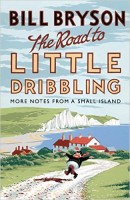The Road to Little Dribbling: More Notes from a Small Island
by Bill Bryson
(Doubleday)
 On his latest tour of Britain, Bill Bryson was very taken with the old Welsh resort of Tenby: “How had this escaped me so long?… I walked up and down every street… and I don’t think I passed a house or cottage that I wouldn’t have been happy to own.”
On his latest tour of Britain, Bill Bryson was very taken with the old Welsh resort of Tenby: “How had this escaped me so long?… I walked up and down every street… and I don’t think I passed a house or cottage that I wouldn’t have been happy to own.”
Unfortunately for the estate agents of Tenby, Bryson has enough property already, and is not intent on buying the place up — though he could probably afford it. In case you’ve somehow missed him, he’s the American-born author the British have licensed to poke fun at them. Every book he writes, whether on the English language or popular science or travel, is a bestseller. Notes from a Small Island was the bestselling travel book ever, with 2.5 million copies sold to date. But it’s 20 years since he wrote that, as his publisher reminded him: “‘Ever thought about a sequel?’ His tone was casual, but in his eyes I could see little glinting pound signs where his irises normally were.”
The pound signs will be in neon by now. As I write, that sequel, The Road to Little Dribbling: More Notes from a Small Island, is ranked by a certain online retailer at number five in humorous books, number 1 in travel books, number 1 in travel books about the United Kingdom, and number 5 in “Books”. And it’s still only available to “pre-order”, which I’m sure is not a phrase the author would approve.
Bryson, a stickler for grammar and correct usage, is pretty hot on proof-reading too: he must be, because The Road to Little Dribbling is the cleanest travel book I’ve read this year. (Clean, that is, of literals and dangling participles, though there are regular appearances of words the Telegraph style book would insist I render as f – – – and s – – – .)
But is it the funniest? Of course it is, if only because there are so many gags per page. Bryson fires a joke more often than Rooney fires a shot. There are lame ones and good ones, but they generally get better as the book goes on. In a chapter on the Peak District there’s a cracker about the dumb faithfulness of the British dog.
Having established that the longest distance you can travel in Britain in a straight line lies between Bognor Regis and Cape Wrath, Bryson starts at one and finishes at the other, but pinballs across the country in between, focusing on places he hasn’t visited before and avoiding, as much as possible, those where he might end up “harrumphing at how things had deteriorated”. That focus turns out to be a weakness, because many of the places that are new to him, while full of good stories, have long ago had those stories wrung out of them by others, and a pinballing tourist has little to add.
Yes, there’s nothing “more brave and noble” than the Royal National Lifeboat Institution, but he didn’t need to go all the way to Mousehole and retell the story of the Penlee lifeboat disaster to remind us. He hadn’t seen the Lost Gardens of Heligan, but more than five million people have, and read quite a lot about them, and might be disappointed that his contribution is that “they are splendid and thronged” and “all very fine”. In Devon, where the railway isn’t what it was in the 1960s (cue three unsurprising pages on Beeching), he goes to Torquay and is reduced to standing in front of the former home of the comedian Peter Cook “without anything like a real thought in my head”.
He’s better when he’s harrumphing, whether at the officiousness of the National Trust or the half-wittedness of highway engineers, and he’s entitled to now he’s 63 and a British citizen. He writes “envision” rather than “envisage”, looks (more frequently these days) for “the men’s room” rather than “the gents’”, and when almost run down by a hedge-cutting machine mutters that its operator is “a hayseed f – – – “. Otherwise you’d never know he’s from Des Moines, Iowa and not Malham, North Yorkshire. The things and places he approves of are “agreeable”, “comely” or “splendid”.
There is much he still approves of 20 years on, and if you’d turn off your mobile phones he’d be happy to tell you so. He is worried, though, that Britain is not the caretaker of its assets that it was, and that the British may be developing a new slyness: “The Britain I came to was predicated on the idea of doing the right thing most of the time whether anyone knew you were doing it or not… You might not leave a tip — you were British, after all — but you wouldn’t pretend to leave a decent tip and then stick in a small coin… It wouldn’t occur to you to be a dick.”
Among his most splendid harrumphs are one at opponents of the green belt and one at supporters of the HS2 rail project. The idea behind the latter, he says, is that if people are transported from London to Birmingham 20 minutes quicker “they could get more work done and all those extra 20 minutes would collectively translate into gazillions of extra pounds for the economy… I think that if you give everyone anywhere an extra 20 minutes, they will just have a cup of coffee. It’s what you and I would do. It’s what anyone does with 20 minutes.”
A shorter version of this review appeared in The Daily Telegraph

Leave a Reply